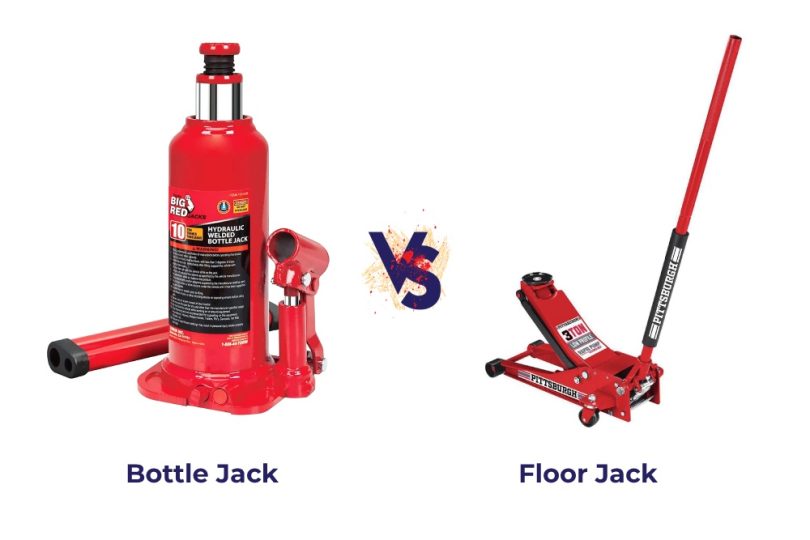Bottle jacks are more compact and easily portable while floor jacks are more stable – so what’s better?
A bottle jack with a base plate is best for lifting heavy loads in tight spaces, such as when changing a tire on the side of the road.
But since floor jacks are designed to be placed on the ground, they are usually used in garages or workshops for maintenance and repair work.
If using a bottle jack for longer trips, make sure you have extensions if your truck is lifted.
Let’s get to know more about the differences between floor jacks and bottle jacks.
| Features | Floor jack | Bottle jack |
| Stability | High | Stable with additional base plate |
| Frame | Wider | Narrower |
| Cylinder and piston orientation | Horizontally | Vertically |
| Caters | Yes | No |
| Pump arms | Longer | Shorter |
| Low clearance jack | Yes | No |
| Navigation space | Larger | Smaller |
| Powerlifting | 3 – 10 tons | 2 – 50+ tons |
| Storage space | Larger | Smaller |
| Overall stability | Stable with jack stands | Stable with additional base plates + jack stands |
| Safety feature | Foot pedal | Jack stand |
| Price | $20 – $450 | $20 – $350 |
Bottle Jack vs Floor Jack: Detailed comparison
-
Stability
With wider frames, floor jacks are more stable than bottle jacks. But you can use your bottle jack with a base plate mount that might work perfectly.
In fact, a floor jack is pretty much useless on dirt and such uneven surfaces while you may have to dig out space for the jack under an axle or something, or clear out rocks and pebbles to make a base for it.
-
Cylinder and piston orientation
Floor jacks have their hydraulic cylinders positioned horizontally, which gives the pistons a horizontal orientation. A design like this is perfect to lift loads on a flat surface like a garage floor.
On the other hand, the bottle jack’s pistons are mounted vertically with the cylinder, which allows it to lift heavy loads in narrow spaces.
-
Pump arm
Bottle jacks have short pump arms that you can enlarge a little with adjustable pieces. But that won’t make much difference since you will still have to work hard to lift the vehicle.
The longer pump arm of floor jacks allows you to generate more leverage and lift heavy loads with minimum pumps.
-
Low clearance
There are low-clearance floor jacks specifically designed for cars with low ground clearance, and their long pump handle allows them for quick lifting and lowering. Bottle jacks don’t have such low-clearance features though.
-
Space to navigate
With the casters and long pump handles, floor jacks need a lot of room to work properly, which means navigating through tight corners or narrow places can be difficult.
If you find yourself in this situation, you might want to consider using a bottle jack instead. Bottle jacks are designed specifically for tight spaces and can easily fit in between the wheels of a car or a truck.
However, there are compact floor jacks available but they cost more and won’t be worth it if used occasionally.
-
Powerlifting
While bottle jacks can lift more weight than some smaller floor jacks, larger floor jacks have a greater lifting capacity than bottle jacks and are better suited for lifting heavy vehicles off the ground.
-
Storage
Floor jacks take up more space in a garage or workshop. As a result, you may have to store them on a shelf or in a corner when not in use. In contrast, the compact bottle jacks can be stored easily in a toolbox or on a shelf.
If you have limited space or if you frequently move your jack around, a bottle jack might be better. However, if you have a larger garage or workshop and need to lift heavy vehicles, go for a floor jack despite its larger size.
-
Safety features
Floor jacks have a foot pedal to balance their hydraulic system and you can use jack stands for enhanced safety. On the other hand, you need to use a jack stand and large baseplate with a bottle jack as safety features.
Bottle Jack vs Floor Jack – Pros & Cons
Bottle Jack – Pros & Cons
Advantages
- Easy to store
- Can lift to 22 inch
- Additional base plates can be added
- Lifting pads of different heights
- Good for trucks and big vehicles
Disadvantages
- Low stability without a base plate
- Can’t lift low clearance vehicles
- Shorter pump arm with minimum leverage
Floor jack – Pros & cons
Advantages
- High stability with a wider frame
- 3-inch low clearance level
- Longer pump arm with maximum leverage
Disadvantages
- Difficult to store
- Not usable without a flat surface
FAQs
1. Are there any types of jacks other than these two?
Ans: There are different types of jacks available for different purposes, for instance:
- Scissor jacks
- High lift jacks
- Mechanical jacks
2. Is there any benchmark to rate jacks?
Ans: Different organizations provide certifications on car jack safety and you need to check these certifications before you make your purchase:
- ASME (American Society of Mechanical Engineers)
- TUV (Technical Inspection Association)
- CE (Conformité Européenne)
- GS (Geprüfte Sicherheit)
3. Are jacks safe to work under without an extra jack stand?
Ans: Yes, all certified jacks are safe to work under but if you are more concerned about your safety, then you can use a jack stand or a base plate.










Leave a Comment